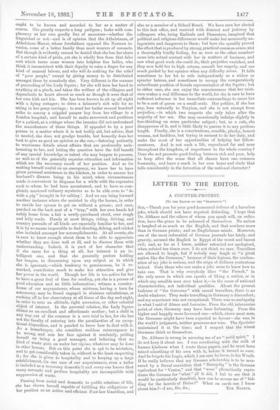LETTER TO THE EDITOR.
A COUNTER-PROTEST.
[To THE EDITOR OF THE " SPECTATOR."1 So.,—Thank you for your good-humoured defence of a harmless joke, which should not have required defending. I hope that Dr. Althaus and the others of whom you speak will, on reflec- tion, have the grace to be ashamed of themselves. No nation is laughed at so much as the Esglish, and that nowhere more than in German prints ; and no Englishman minds. Moreover, one of the most influential of German journals has lately, and. gravely, accused the English in Egypt of the worst and basest evil; and, as far as I know, neither retracted nor apologised, when refuted ten times over. I do not think we care. Travellers are allowed to laugh, but if nobody may laugh at "a great nation like the Germans," because of their legions, the confirm- ation of my joke is serious, and the reign of dullness portentous indeed. Only those who can make a joke seem to know how to take one. That is why everybody likes "the French," in the only sense in which one speaks of liking a nation, or in which any sensible man ever takes it,—in the sense of national characteristics, not individual qualities. About the present fashions of the Germans" with casual travellers, there is no doubt whatever. They make travelling in Germany a discomfort; and my experience was not exceptional. There was no ambiguity in what! said of Alsace and Lorraine. From the old, internecine point of view, Germany may have been forbearing. From the higher and happily more favoured one—which, above most men, the Germans might have been expected to favour—she was, in the world's judgment, neither generous nor wise. The Spectator maintained it at the time ; and I suspect that the wisest Germans think so themselves.
Dr. Althaus is wrong in accusing me of an "acrid spirit." I do not keep it about me. I was overflowing with the milk of human kindness when I wrote those papers, and he must have mixed soMething of his own with it, before it turned so sour. And he forgets his Logic, which I am sure he loves, in his Wrath. If he really believes that my German scholarship is to be mea- sured by a literal conviction that " Bennydig " is the German equivalent for "Venice," and that " woss " phonetically repro- duces the German for "what" (if it did, I fail to see that it would be particularly dreadful), how can he accuse me of "bid- ding for the laurels of Heine ?" What on earth can I know


































 Previous page
Previous page